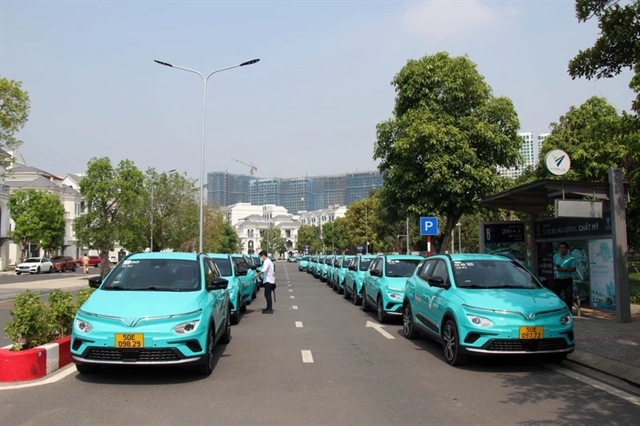
|
| Xanh SM taxi fleet is an image of environmentally friendly cars in Việt Nam. — Photo of nhandan.vn |
HÀ NỘI — Transport experts and economists discussed how preferential policies for environmentally friendly cars and double-cabin pickup trucks can create distinct competitive advantages during the green transition period.
During a special seminar, Nguyễn Minh Thảo, who is the head of the Business Environment and Competitiveness Research Department at the Central Institute for Economic Management (CIEM) in Việt Nam, discussed the impact of draft revisions to the regulations on the special consumption tax (SCT) for certain vehicle types.
Participants at the seminar suggested that the drafting agency should determine a suitable tax rate for vehicles and develop a clear and feasible plan for how this tax rate would be implemented and applied.
Specifically, the Draft Amended Regulation on Special Consumption Tax for Automobiles includes specific proposals to maintain tax rate for double-cabin pickup trucks, offer tax reduction incentives for environmentally friendly vehicles such as externally charged hybrid electric vehicles (PHEVs) and self-charging hybrid electric vehicles (HEVs).
A representative of the Vietnam Automobile Manufacturers Association (VAMA) said that Việt Nam is undergoing a crucial transition phase. There is a clear global shift towards electrification in the automobile industry, including here. Việt Nam’s growth in this sector is supported by international commitments to environmental protection and climate change mitigation.
Despite the potential, the industry faces significant obstacles during this transition period. These challenges could include infrastructure development, technology adoption and market readiness.
The car market is indeed facing several significant challenges in the current environment. The economic impacts of the pandemic, such as reduced consumer demand, supply chain disruptions and manufacturing slowdowns, have created difficulties for the industry. While, geopolitical uncertainties and conflicts can disrupt trade, affect access to resources and create volatility that impacts the automobile sector.
In this context, tax policy adjustments can be an important lever to support the automobile industry and facilitate the transition to sustainable transportation. Appropriate tax incentives, credits or other policies can directly impact businesses, consumers and the overall economy’s stability and movement towards sustainable development.
The draft Law on Special Consumption Tax has several implications for the domestic automobile industry in Việt Nam.
The new tax law likely aims to incentivise the production and assembly of more fuel-efficient and lower-emission vehicles to support Việt Nam’s climate change goals and net-zero emission target by 2050.
This could involve differential tax rates or incentives for automakers based on the fuel efficiency and greenhouse gas emissions of their vehicle models.
The policy changes need to be implemented in a synchronised and comprehensive manner, balancing the benefits of automakers, consumers and the Government. — VNS
- Reduce Hair Loss with PURA D’OR Gold Label Shampoo
- Castor Oil Has Made a “Huge” Difference With Hair and Brow Growth
- Excessive hair loss in men: Signs of illness that cannot be subjective
- Dịch Vụ SEO Website ở Los Angeles, CA: đưa trang web doanh nghiệp bạn lên top Google
- Nails Salon Sierra Madre
 VnExpress News The News Gateway of Vietnam
VnExpress News The News Gateway of Vietnam




